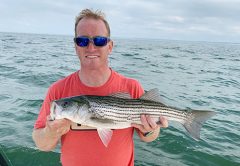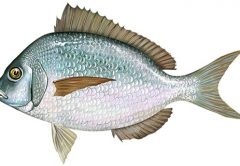Sport Fishing
While I played enough sports in my years before the deck to have genuine misgivings about calling fishing a “sport” in the tradition sense of the word, my experience both behind the reel or the gaff has shown me that there’s room to excel (and fail in epic fashion) wherever the goal is hauling fish from the brine. I’m talking about those rare, sometime astonishing moments when you find yourself punching 100 pounds above your weight class, or, for whatever reasons of mechanical technique or heightened, near-total focus, you suddenly perform light-years beyond your predicted median skill level.
More to the point of this minor installment, I have experienced such moments of intense, sudden-onset competence, followed almost immediately by great and terrible run-ins with the @#$%-set fairy. In that regard, fishing, like watching Boston-area professional teams, can deliver the precise brand of heart-in-your-throat highs and total, mind- boggling disappointment—the entire emotional range packed into a relative handful of seconds—that has long drawn humans to the arena, as gladiators or as spectators.
One night some years back, while working a night bass trip to Block Island, I realized that I’d landed in one of those thrilling situations where I could do no wrong. Working to pick out a nasty backlash for a kids in the bow, I could see through the nest of overlapping coils right to the core of the problem, cleared the spool inside 15 seconds, took a few cranks to lay what I’d just yanked off back on the spool neatly. I felt something whack the boy’s diamond jig, reared back and sunk the hook, and watched the rod bow down under a mighty load. Passed the rod off to the kind—might have winked at him the way sporting legends do. He might have said: Gee Mister, you’re the greatest of all time.
Of course, by then, I was already in the stern holding the handle of a gaff I’d already stroked right through a good striper’s left eye, bleeding the fish and executing all in the act of preparing to land it. It’s possible that the entire deck-load of 20-plus customers cheered and formed a single line, and possible that I then ran right up the rail, high-fiving my entire fan club for the evening.
When I reached the bow to help a little old lady bait her hook with an eel I’d had the foresight to grab from the stern before I started my high-five victory lap. As I dropped her baited hook back outboard and, in the same fluid motion, removed my rain jacket to place it over a bloody spot on deck so the same elderly woman wouldn’t dirty up her shoes, a middle-aged man five rod holders after called “Fish Up!” I noted he’d brought a dreaded dogfish to the surface. I pointed at the fish and said, in a perfectly even tone, “Be gone…” The fish unhooked itself. Then, the fish might well have burst into flames and hurled itself into a running wood-chipper two miles distant near the center of the Island.
The thing, when you’re in that kind of zone is that you take all the layers of conflicting stimulus assaulting your senses and dispatch every incoming task without losing your absolute focus. The times I’ve felt it, firing whole games of aces on a tennis court years ago, or taming a high-40s striper inside a minute, it manifests as absolute presence of mind—absolute engagement with the present moment. But that’s neither here nor there.
Because a 30-something woman amidships is calling for help. She’s holding on for dear life as a very large striper pitches a wild fit in the depths. On the scene in two seconds flat, I assess the situation. The woman says she can’t reel. Looking at the spool, I immediately see why.
Somehow during the fight, the woman has managed to bump the great, growing coils that soon fetch up on each other and form one of those backlashes I expect one day to tell my grandkids about. The spool will not, cannot move, and as I accept the rod and begin trying to sort out the tangle with utmost care, the fish bolts again, dragging the disabled rod down into a dangerous arc, mono crackling and stretching as I silently plead with the fish to calm down.
Soon, the bend eases slightly. “Good fish,” I say in a calm tone— understatement is what the most nautical deckhands do in such situations. Cool, calm, and collected. I start to try to work on the backlash. Despite my otherworldly reverse-knitting skills, this one won’t budge: it’s the sort of rat’s nest that you’ll only remove with a blade. My partner on deck, Donny, strides up just as I’ve devised the perfect solution.
“Wanna just hand-line it?” offers Donny, who has the gift of common sense on an uncommon level.
I tell him I’ve got an idea. “You wanna…”
I nod, then ask Donny to go grab a second rod, which he does. I try not to make any sudden movements with the rod, maintain steady pressure and hope the fish will stay put, take the opportunity to sulk and rest up. One more good run, and I’m afraid this line is going to part off.
“Mind snipping the rig off that one?” I ask. “You want the leader, or do you wanna tie the knot?”
I step back with the rod so he can grab the line, then pass the the defunct rod off to a customer while Donny begins, very slowly, to hand-over- hand some slack into the line, take the strain on the business end of the line to give us a bit of leeway while I splice the “hot” line to the back-up rod. When we have six feet of slack, I snip it clear, and quickly go to work blood-knotting the tag ends together, completing the knot in under 20 seconds, cutting back the tag ends.
I then hand the clear rod to the woman while Donny holds the hooked fish.
She follows our directions and Donny releases the line. The battle resumes.
Pull, up, reel down. Pull up real down. Pull up, real down. In my head, meanwhile: Who does that?! That’s right: No one does that!
Pump up, reel down—don’t give that fish any slack, we’re really pushing our luck here.
She fights what is clearly a solid fish for some time.
Then, from over my shoulder: “I can’t reel. This handle won’t turn….” Now what?! I peer down into the murky water—still no color. The fish is staying deep.
“I can’t reel…” She says it again, timidly. By this time a crowd has assembled to get a close look at the nautical wonders underway. I turn around to see what she’s done to sabotage the rod a second time.
And I see it. I look up for evidence of the captain, who must be jammed up at the helm, keeping the drift straight. I yell for Donny again.
The line, through no fault of our angler, has jammed up under the cross bar. It’s not that she failed to level-wind while she reeled; the line is packed tightly on the spool. All the way to the top of the flanges. She couldn’t turn the handle if she tried. Nice one, Zach…Idiot!
“You wanna just hand-line the fish?” asks Donny—again—without emotion. Probably should have done that the first time. I apologize.
Donny gingerly pulls the fish toward the blinding sodium spreader lights–first floor, coming up. A minute later, he announces “color,” and I stand ready with the gaff.
The fish surfaces, I sink the gaff in her head, and lift he clear of the rail. She hits the non-skid deck with a tremendous thump. The hook drops free from a half-inch hole in the jaw. We barely got her.
Still, she scales just over 46 pounds. I put in a quiet performance for the remainder of the night, thankful that we at least managed not to lose our big fish for the season.
On the way home, the fish all cut and the boat as clean as she’ll get this side of the freshwater at the dock, I head into the wheelhouse, confess my incredible stroke of stupid to our Fearless Leader.
“I know,” he says. “I watched the whole thing.” The silence stretches while I twist in the breeze.
He continues: “Actually, it was a good idea. Just—next time—you want to splice the fish to a reel that’s not already spooled all the way up.”
One thing I know for sure: I’ll make a thousand more mistakes in ,my fishing career, but that’s one I will never make again.










